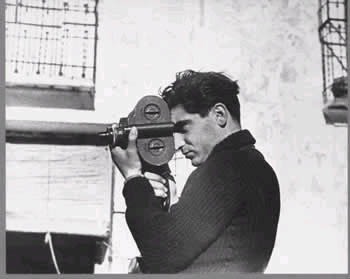
Life Portrait
Written by Chrystal Sturtevant | Posted by: Anonymous
"The war photographer’s most fervent wish is for unemployment." In a time when our country is at war, this quote made by legendary war correspondent and photographer Robert Capa makes all too much sense.
On May 28th, a special PBS "American Masters" documentary will be aired, honoring the life and contributions that Capa has made to the art of war photography. Written, directed, and produced by Middlebury, Connecticut native, Anne Makepeace, "Robert Capa: In Love and War," explores the eventful life of a man who continuously ventured in harm’s way in order to capture the realism of war on film.
"He was the only photographer to go with the first wave of infantrymen on Omaha Beach in World War II, and he was the first war correspondent to die in Vietnam," Makepeace said.
In addition to his photographic talents, Capa was known for his impressive people skills. Over his 40 years, Capa transformed from a Hungarian Jew caught in the political turmoil of the 1930s into "the greatest war photographer in the world," the title given to Capa by the "Picture Post," (a British Magazine) in 1938 after they published his prints of the Spanish Civil War. Before his death in 1954, Capa traveled throughout Hungary, America, Europe, China, Vietnam, and North Africa, taking pictures of five wars around the globe, and attracting the company of everyone from soldiers and civilians to popular writers and Hollywood stars.
"He had charm and charisma. He was a dashing, sexy, and romantic guy, who was involved in intense love affairs. He loved children, and took pictures of everyday life as well. As for war photography, he invented ways of looking at war that photojournalists have used as touchstones," Makepeace said.
Makepeace has been writing, directing, and producing in the film industry for over 20 years, and has had her award-winning films aired on a number of networks worldwide, including PBS, HBO, Bravo, Showtime, USA and National Geographic. With credits such as "Baby It’s You," "Moonchild," "Night Driving," "Whistle in the Wind," and "Coming to Light: Edward S. Curtis and the North American Indians," Susan Lacy, producer of the PBS American Masters series was confident that Makepeace was the best person for the job.
Makepeace was commissioned to write, produce and edit the Robert Capa project in August in 2001, and was asked to deliver the production in a year. During the process, Makepeace and her small crew filmed in six European countries and in New York and California as well.
"Being a writer, producer, and director, takes a lot of thinking and planning, but basically it all fits together as one. Johanna Redneck, the co-producer, was a godsend. Just trying to tell the story is the hardest part. To tell a life story in 90 minutes isn’t easy," Makepeace said.
So how did this Connecticut woman get her start? Makepeace said she went to Stanford and graduated with a BA in English, then got her Masters in education there. She became interested in entertainment after using film and video in her classes, and soon fell in love with filmmaking. She decided to go back to Stanford and study film. While in school she made her thesis film, "Moonchild," and the movie was sold to HBO, Bravo, PBS, and a number of networks around the world.
"When I’m making movies, I feel the most alive. It challenges me, and inspires me. My goal is to make good movies that tell good stories that will affect people intellectually and emotionally," Makepeace said.
When asked what advice she would give to someone wanting to get into the film industry, Makepeace lightheartedly referred to a phrase her teacher used to say, "‘If there’s anything else that you would like to do, and you’d be happy doing it, do it!’ There’s a lot of sacrifice. I’ve had slow and dry times in my career, but there’s nothing else I want to do, nothing else that makes me feel that I am using everything I know and learning at the same time. It’s who I am. It’s my choice, but I wouldn’t wish the sacrifices and insecurities this life requires upon anybody else."
For information about the American Masters PBS series, visit www.pbs.org/wnet/americanmasters/.








